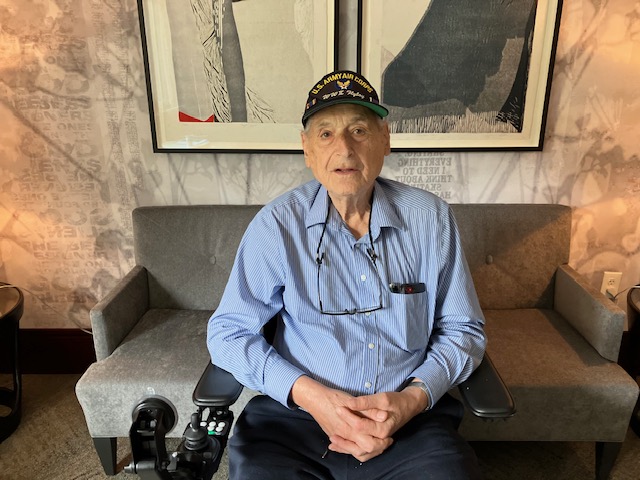
Robbins: At 100, Lt. Benjamin continues to inspire
If 100 can be said to be the new 70, Lieutenant Alfred D. Benjamin of the Army Air Corps’ 384th Bomb Group has to be the expression’s poster boy. Ramrod-straight and sharp as the proverbial tack, the Canton centenarian is as smart as the salute he gives as he finishes an interview about his service as a B-17 navigator flying 31 bombing missions over Nazi-occupied Europe in WWII’s final year.
Born to parents of Eastern European Jewish origin in April 1924, Benjamin decided in junior high to fly planes in defense of America. “I was always interested in it,” he says. He found a bookstore in downtown Boston that sold government-issued navigation and piloting manuals, and studied them.
After graduating high school in 1942, his determination to fly planes took on new intensity. He moved through basic training, cadet classification and then pilot school. There a colonel took him aside. Even though he was well-suited to flying fighters, he said, “we don’t have enough good navigators.” Benjamin switched to navigation training. “He was a colonel,” Benjamin laughs. “I was a kid. What could I say?”
At age 19, Benjamin and his newly assigned crew made their way from the B-17 pick-up point in Kearney, Nebraska, to New Hampshire, up to Newfoundland and then Iceland before arriving at Army Air Force Base No. 106 in Grafton Underwood, England. From July 1944 through January 1945 Benjamin navigated his crew on bombing missions aimed at German military targets. He held his crew’s lives in his hands as he steered them around anti-aircraft fire, shells built to explode in mid-air and hurl thousands of pieces of deadly shrapnel at incoming American planes. Each piece of shrapnel was capable of slicing through engines, propellers, and human flesh.
Benjamin remembers that back at the base, each barrack housed three B-17 crews. There were times that when he and his crew returned from a mission, they were the only crew in the barrack that night. Asked how he dealt with that, Benjamin says “I don’t know.”
In September 1944, on his 13th mission, Benjamin’s plane was hit by German anti-aircraft fire, and lost first two engines, and then a third. He maneuvered the plane to an area over German-occupied Belgium that he calculated might no longer be filled with German soldiers. He had his crew wait until the last possible minute before they jumped. It was the first time he had ever used a parachute.
It was a good thing for his crew, and for Benjamin, that he was the navigator. They landed in a field that had just been vacated by retreating Germans. Had it been otherwise, Benjamin recalls, “we would have been dead.”
Injured in the process, Benjamin and some of his crew mates spent days in a local Catholic hospital. One day he asked a nun why she was cleaning the hospital. “There’s a whole lot of people out there who want to shake your hands,” she replied. “They wanted to thank Americans for saving them,” Benjamin says.
Back in American-liberated France, Benjamin was told by medical personnel that he could return to his base and keep flying “if you want.” Benjamin did. “I wanted to be with my buddies,” he says.
He flew 18 more combat missions, risking his life for his country each time.
Back home, Benjamin met 16-year-old Lorraine Bernstein, of Boston’s West End. She told him she was 18. When he later asked her why she’d said that, she answered: “I didn’t want to lose you. I thought you were a good catch.”
“I guess I was,” he says, “because we were married 74 years.”
Lorraine passed away at age 93 this past January. They have three sons.
Benjamin shows his interviewer his apartment. He has more than a dozen medals, from the United States and the French governments. He hasn’t said a word about them, and doesn’t now.
He is simply happy to have served. He has nothing more to say.
Jeff Robbins, a former assistant United States attorney and United States delegate to the United Nations Human Rights Council in Geneva, is a longtime columnist for the Boston Herald.
Alfred Benjamin at 19. (Photo courtesy Jeff Robbins)


